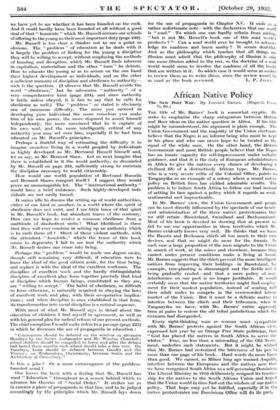African Native Policy
TRE title of Mr. Barnes' book is somewhat cryptic. Ile seeks to emphasize the sharp antagonism between British and Boer ideas on the native question in Africa. If his title might be misunderstood, his argument is plain enough. The Union Government and the majority of the Union electorate believe that the Negro is an inferior being who must be kept in his place and who can never hope to be treated as the equal of the white man. On the other hand, the British Government and most British people believe that the Negro has an innate capacity for self-improvement under suitable guidance, and that it is the duty of European administrators in Africa to give the natives every chance of developing a civilized life of a distinctively African type. Mr. Barnes, who is a very severe critic of the Colonial Office, points to Tanganyika as an example of a colony where a sound native policy on British lines has yielded admirable results. The problem is to induce South Africa to follow our lead instead of setting its face against a policy which it regards as weak, sentimental and impracticable.
In Mr. Barnes' view, the Union Government and people can be most directly influenced by the spectacle of our benefi- cent administration of the three native protectorates that we still retain—Basutoland, Swaziland and Bechuanaland. Most of his book is devoted to showing that at present we fail to use our opportunities in these territories which Mr. Barnes evidently knows very well. He thinks that we leave the Basuto and Bechuana chiefs all too much to their own devices, and that we might do more for the Swazis. In each case a large proportion of the men migrate to the Union in search of work, at the mines and elsewhere, because they cannot under present conditions make a living at home. Mr. Barnes suggests that the chiefs prevent the more intelligent natives from improving their holdings—in Basutoland, for example, tree-planting is discouraged and the fertile soil is being gradually eroded—and that a mere policy of non- interference on our part is no -longer justifiable. It would certainly seem that the native territories might find employ- ment far their modest population, instead of sending half their adult males to compete in the overcrowded labour market of the Union. But it must- be a delicate matter to interfere between the chiefs and their tribesmen, when in Tanganyika we have with Mr. Barnes' entire' approval, been at. pains to restore the old tribal jurisdictions-which the Germans had disregarded.
Every right-thinking man or woman must sympathize with Mr. Barnes' protests against the South African view, expressed last year by -an Orange Free State politician; that "
God has- -placed the natives in South Africa 'to serve the whites." Fear, no less than a misreading of the Old Testa- ment, underlies such statements. But it might be wished that Mr. Barnes had restrained the bitterness of his. pen in more than one page of his book. Hard words do more harm than good. • We cannot, as Milner lang ago warned Asquith, interfere between the Europeans and the natives now that -we have recognized South Africa as a self-governing Dominion. The Liberal Ministry in 1910 deliberately resigned its trustee- ship for the natives to the• South African Union and hoped that the Union would• in time find out the 'wisdcimnf our nut: policy. That hope may yet be fulfilled, especially if in the native Protectorates -our DoMinioni Office will do its part.












































 Previous page
Previous page